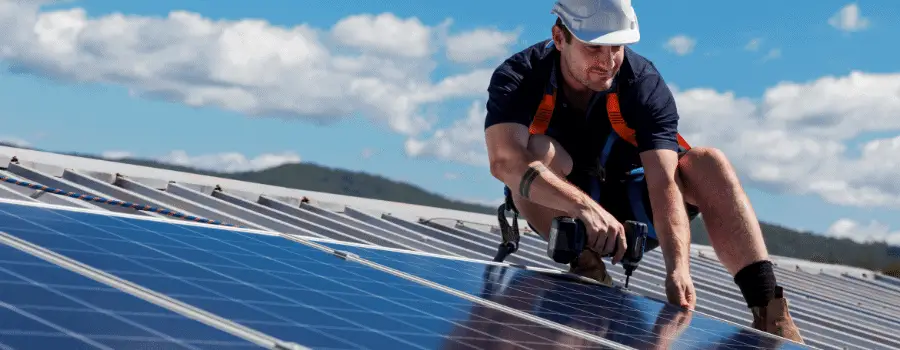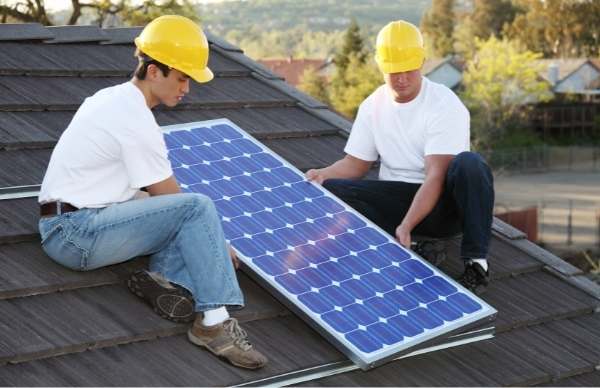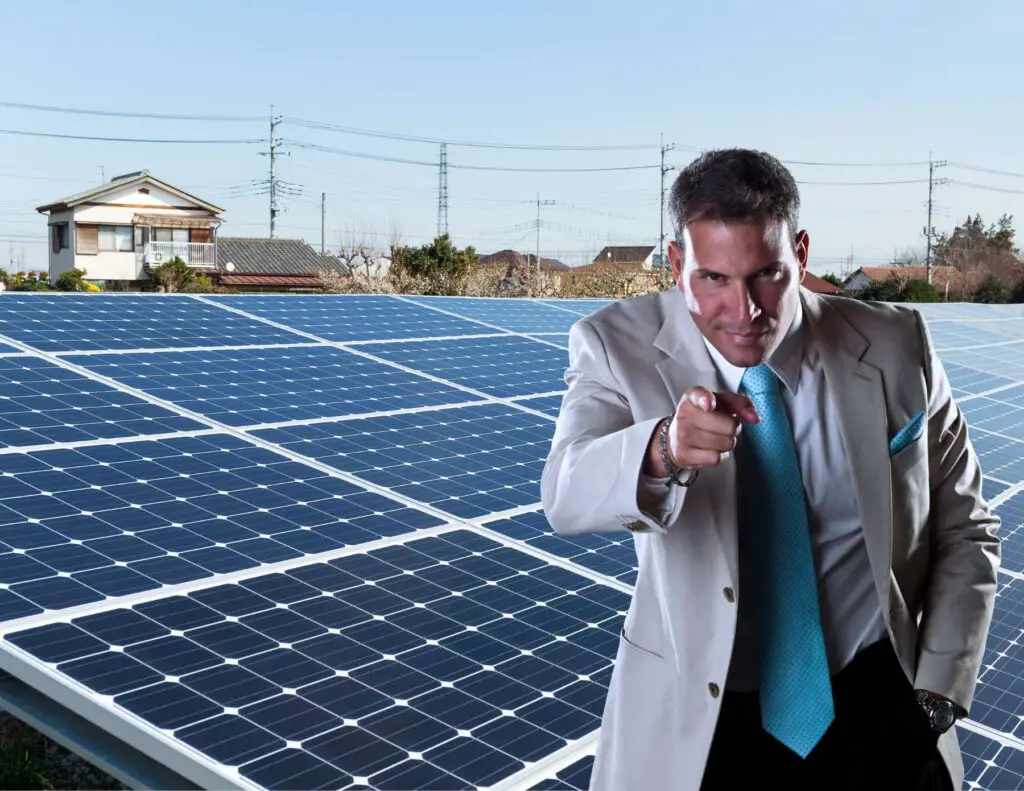
Choosing a solar installer for your home is a crucial decision in the process of transitioning to renewable energy. With numerous options available, it’s essential to carefully research, compare, and evaluate solar installers to ensure a smooth and efficient experience. The right professional will be certified and experienced, use high-quality solar panels, and provide exceptional customer service.
To make an informed decision, homeowners should seek multiple quotes from various solar installers, which will aid in understanding price points, warranties, and contract details. Assessing solar equipment and technologies is also necessary, as different offerings may better suit the specific needs of a home.
Furthermore, considering a solar professional’s licenses, insurance, and customer reviews will help guarantee a successful installation, thus saving both time and money in the long run.
Key Takeaways
- Research various solar installers, compare quotes and contract details
- Assess the solar equipment, technologies, licenses, and insurance offered
- Prioritize customer service, reviews, and post-installation support for a seamless experience
Table of Contents
Finding the Right Solar Installer
Identifying Reputable Companies
When choosing a solar installer, it is essential to identify reputable companies. A simple way to ensure a company’s legitimacy is to check its presence on platforms like the EnergySage Marketplace or the Better Business Bureau (BBB). These platforms provide reviews, ratings, and complaint history that can help you gauge the credibility of solar installers.
Evaluating Expertise
When choosing a solar installer, consider their experience installing solar systems in similar homes or environments. Don’t hesitate to ask for references or case studies highlighting their past work. This will give you a better understanding of their level of knowledge and expertise in the field.
Importance of Certifications
Certifications, such as NABCEP (North American Board of Certified Energy Practitioners), indicate that the installer has undergone rigorous training and achieved industry-recognized milestones. When choosing a solar installer, look for ones with certifications to ensure they possess the technical know-how to properly install and maintain your solar system.
Considering Local vs National Installers
There are pros and cons to both local and national solar installers. Local installers typically have more knowledge of regional incentives and regulations, which can result in a smoother installation process. They may also provide a more personalized approach and faster response times for maintenance.
On the other hand, national installers often have established relationships with financing and equipment providers, which can result in cost savings. They also have a larger workforce and can offer more comprehensive warranties.
When choosing between local and national installers, consider the importance of personalized service, response time, and potential cost savings to find the right fit for your needs.
Getting Multiple Quotes
Comparing Cost and Savings
When choosing a solar installer for your home, it’s important to gather multiple quotes to ensure you are getting the best possible deal. By comparing cost and savings from different installers, you can be confident in your decision and make a well-informed investment.
Obtain 3-4 quotes from various solar installation providers to evaluate the costs, materials, and installation plans. Doing so allows you to assess different solar panel systems, their estimated energy savings, and how these can impact your monthly utility bills. It’s also essential to consider any potential discounts or local incentives that may be available, as these can significantly influence your overall costs.
Evaluating Financing Options
When reviewing quotes from solar installers, it’s also crucial to examine their financing options. Different installers may offer varying financing choices, such as solar loans, leases, or power purchase agreements (PPAs). Thoroughly compare the terms and conditions of each option and analyze how they align with your budget and financial goals.
In addition to weighing the cost of each solar panel system, scrutinize factors like interest rates, contract length, and penalties for early termination or default. By doing so, you can select a financing option that best suits your needs and minimizes risks.
When Hiring a Solar Installer, What are you Getting?
When hiring a solar installer, you are getting a professional service that encompasses the entire process of installing a solar panel system for your home or business. Here are some key aspects of what you can expect from a reputable solar installer:
- Consultation and Assessment: A solar installer will start by evaluating your property and assessing its solar potential. They will consider factors such as roof orientation, shading, energy consumption, and available space to determine the most suitable solar solution for your needs.
- System Design: Based on the assessment, the solar installer will design a customized system that meets your energy requirements. This includes determining the optimal number and arrangement of solar panels, selecting the appropriate inverter technology, and considering any additional components like batteries for energy storage.
- Procurement of Equipment: The solar installer will handle the procurement of all necessary equipment for your solar panel system. This includes sourcing high-quality solar panels, inverters, mounting systems, wiring, and other components required for the installation.
- Permits and Paperwork: Solar installation involves obtaining permits and adhering to local regulations. A professional solar installer will take care of the paperwork, ensuring that all necessary permits and approvals are obtained before commencing the installation process.
- Installation and Wiring: The solar installer will handle the actual installation of the solar panels on your roof or ground-mounted system. They will securely mount the panels, connect them to the electrical system of your property, and ensure proper wiring and grounding to ensure safety and optimal performance.
- System Testing and Commissioning: Once the installation is complete, the solar installer will conduct thorough testing to verify that the system is functioning correctly. This includes checking electrical connections, performing insulation tests, and confirming that the solar panels are generating electricity as expected.
- Monitoring and Maintenance: Many solar installers offer monitoring services to track the performance of your solar panel system. They may provide online portals or mobile apps that allow you to monitor your energy production in real-time. Additionally, reputable installers may offer maintenance packages or warranties to address any potential issues that may arise in the future.
- Assistance with Incentives and Financing: A knowledgeable solar installer can guide you through the process of accessing available incentives, rebates, and tax credits for solar installations. They can help you understand the financial benefits and assist with any necessary paperwork or applications.
Understanding Warranties and Contract Details
When choosing a solar installer for your home, it’s essential to understand the warranties and contract details offered by each company.
Workmanship Warranties
Workmanship warranties are specific to the installation work performed by the solar installer. These warranties usually range from 1 to 10 years and cover any issues that may arise due to the installer’s work. When choosing a solar installer, it’s essential to:
- Check what’s included in the workmanship warranty
- Inquire about any exclusions
- Determine if there’s any cost involved in case the installer needs to inspect or replace equipment during the warranty period
Manufacturer Warranties
Manufacturer warranties, on the other hand, cover defects in the solar panels resulting from the materials used or errors during manufacturing. These warranties generally fall into two categories: product warranties and performance warranties.
- Product Warranties: Also known as equipment or materials warranties, product warranties protect against defects in the solar panels themselves. These typically last for 10 to 12 years and cover any issues resulting from material quality or manufacturing errors.
- Performance Warranties: Performance warranties guarantee a certain level of production over the solar panels’ lifespan. They usually guarantee 90% production at 10 years and 80% at 25 years. This type of warranty ensures that the solar panels continue to produce power efficiently throughout their expected lifespan.
Assessing Solar Equipment and Technologies
Solar Panels
When choosing a solar installer for your home, it is essential to assess the solar equipment and technologies that are available. Solar panels, the primary component of solar energy systems, are diverse in terms of efficiency, size, and brand. High-quality solar panels are an important factor when determining the overall performance and durability of your home’s solar installation.
There are various types of solar panels: monocrystalline, polycrystalline, and thin-film, each with their own advantages and drawbacks. Researching the differences between these technologies can help you select the most suitable type of solar panel for your needs. Some factors to consider when assessing solar panels include:
- Efficiency: The conversion rate of sunlight into electricity. Higher efficiency panels will require less surface area to generate the same amount of electricity.
- Temperature coefficient: The extent to which panel efficiency is affected by high temperatures. Lower temperature coefficients are preferred for better performance in hot climates.
- Durability: The build quality of the panels and their ability to withstand harsh weather conditions.
- Warranty: The length and comprehensiveness of the manufacturer’s warranty — a longer warranty can indicate confidence in the panel’s quality.
Efficiency
Solar panel efficiency is a crucial factor to consider when choosing a solar installer and equipment. Higher efficiency solar panels produce more electricity per square foot, which means you can install fewer panels while still meeting your energy needs. This is particularly important for homeowners with limited roof space or shading issues.
Efficiency depends on both the quality of the solar cells and the type of solar technology used. Monocrystalline solar panels generally offer higher efficiencies compared to polycrystalline and thin-film panels due to their higher-grade silicon and construction. Comparing efficiency ratings across different brands and models can help you identify the best solar panel option for your home.
Brands
There is a wide range of solar panel brands on the market, and choosing a well-known and reputable brand can be beneficial for several reasons:
- Reliability: Established brands with a history of successful installations and satisfied customers are more likely to provide reliable and durable products.
- Warranty: Reputable solar manufacturers typically offer longer warranties, which can provide peace of mind and protection against potential issues.
- Support: Brands with a good track record are more likely to offer comprehensive customer support and better after-sales services.
Taking the time to study the solar equipment options and technology differences can help you make an educated decision when choosing a solar installer for your home. Doing so ensures that your solar energy system is efficient, reliable, and well-suited to meet your electricity needs.
Considering Licenses and Insurance
Installer Licensing and Insurance
When choosing a solar installer for your home, it is important to ensure they are licensed and insured for solar installations.
A reputable company should hold certifications such as the NABCEP (North American Board of Certified Energy Practitioners) certification, which demonstrates expertise in the industry. Additionally, the installer should be listed on platforms such as EnergySage, which verifies the credentials of solar companies.
Remember to confirm that the solar installer has appropriate licenses and insurance coverage for their work. This includes:
- Licenses: Verify that the installer possesses valid licenses to conduct residential solar projects in your area.
- Insurance: Confirm that the installer carries sufficient insurance coverage, including liability and workers’ compensation policies, to protect both your property and their employees.
Sub-Contractors
In some cases, solar installers may work with subcontractors for specific tasks during the installation process. It is important to ensure that these subcontractors meet the same standards regarding licensing, certifications, and insurance as the main installer.
You can achieve this by:
- Asking the solar installer if they will be using subcontractors on your project.
- If subcontractors will be used, requesting their credentials and verifying their licenses and insurance coverage.
- Checking if the subcontractors have the necessary expertise and certifications (such as NABCEP) to perform their assigned tasks.
Ensuring that both the main installer and any subcontractors meet the required criteria will help guarantee a high-quality installation for your solar energy system.
Evaluating Customer Service and Reviews
When choosing a solar installer for your home, it’s essential to assess their customer service and reviews.
Online Reviews and Testimonials
Researching and reading online reviews and testimonials is a great way to gauge the quality of service that an installer provides. Look for credible reviewers who have had personal experiences with the company. Try to identify any trends among negative reviews and determine if they represent a larger issue.
While examining the online reviews, also check if the company holds an industry-standard certification, such as the North American Board of Certified Energy Practitioners (NABCEP), which indicates a high level of expertise in solar installations.
Communication and Transparency
Another essential aspect of evaluating a solar installer’s customer service is assessing their communication and transparency. When discussing your project with the installer, ensure they are:
- Providing clear and concise information about the solar equipment and installation process
- Open about their reputation for excellent customer service and quality solar installations
- Responsive and informative to questions and concerns about the project
- Transparent about any installer-tiering badge systems they may have, which can help differentiate good installers from the best ones

Installation and Post-Installation Support
When choosing a solar installer for your home, consider their expertise in installation and post-installation support. A reliable installer should have the necessary credentials and experience in solar panel installation, as well as in meeting local permitting and building codes.
Before hiring a contractor, homeowners should verify that the installer is certified and equipped to handle the unique requirements of their rooftops.
Solar providers must have a solid understanding of various roof types and materials to ensure a proper installation that doesn’t cause unnecessary damage or repairs.
In some cases, installers may adjust the position of protruding vents or specific components to improve the overall appearance of the solar array on the roof.
Another aspect to keep in mind is the permitting process for solar panel installations. A competent installer should be able to guide the homeowner through the permitting process and ensure local building codes are adhered to. This will help avoid any potential violations or complications during the installation phase.
Upon completion of the installation, ongoing support plays a vital role in ensuring the efficiency of the solar panel system. Homeowners should opt for solar providers that offer comprehensive maintenance and repair services to keep the solar panels running smoothly and efficiently throughout their lifespan.
Some key aspects to consider in regard to post-installation support include:
- Regular maintenance checks of the solar system
- Prompt troubleshooting and resolution of issues
- Clear communication channels for any inquiries or concerns
Maximizing Incentives and Rebates
Federal and State Tax Incentives
One important aspect of choosing a solar installer for your home is understanding and maximizing incentives and rebates.
The federal government offers tax incentives for residential solar photovoltaic (PV) systems, which can significantly reduce the cost of your investment.
In the US, congress passed an extension of the Investment Tax Credit (ITC), raising it to 30% for installations completed between 2022-2032.
State incentives also play a critical role in making solar energy more affordable for homeowners. For example, California offers cash rebates on home solar installations through the California Solar Initiative (CSI).
Depending on your state, you may be eligible for additional tax credits, exemptions, or other incentives. Make sure to research your state’s specific programs and consult with your solar panel installer to maximize these benefits.
Local Incentives
In addition to federal and state incentives, many local governments and utility companies offer their own incentives and rebates for homeowners who choose to install solar panels.
These programs can vary greatly in scope and size, so it’s important to investigate what’s available in your specific area. Some examples of local incentives include:
- Property tax exemptions for solar panel installations
- Rebates or discounts from your local utility company
- Low-interest loans or financing options for solar equipment
To make the most of the available incentives and rebates, it’s crucial to select a knowledgeable solar panel installer who is well-versed in the various programs at the federal, state, and local levels.
A reliable installer can help you determine which benefits you’re eligible for, complete the necessary paperwork, and navigate the application process to ensure the maximum return on your investment.

Avoiding Scams and Untrustworthy Installers
Choosing the right solar installer is crucial for a quality solar installation. To avoid scams and untrustworthy installers, keep the following tips in mind.
Before selecting a solar installer, it’s important to do thorough research. Start by checking the installer’s reputation through online reviews and testimonials. Look for companies with experience in the field and a transparent history of successful installations.
It’s also wise to ensure the chosen installer is licensed, bonded, and insured for residential solar projects in your area. Verify the credentials of any subcontractors they might use on your project as well.
One common scam to look out for is the misrepresentation of solar incentives. There are federal, state, and local incentives available for those who decide to go solar. Some untrustworthy installers might exaggerate these incentives or make false promises related to them.
Keep an eye on solar installers who promise drastic reductions in utility bills or guarantee performance without taking shade into consideration. The efficiency of solar panels can be affected by factors such as shade from trees or buildings, so a trusted solar installer should always assess your property thoroughly to provide accurate estimates.
When vetting potential installers, remember that lower prices might not always translate to a good deal. Be cautious of companies offering significantly lower prices than their competitors, as this could indicate lower-quality equipment, less experienced installation teams, or hidden costs.
How Can I Reduce My Solar Installation Costs?
If you’re considering installing solar panels but are concerned about the associated costs, there are several strategies you can employ to reduce your solar installation expenses. By implementing these cost-saving measures, you can make solar power more affordable and accessible for your home or business.
- Compare Prices: By obtaining quotes and evaluating different providers, you can identify the most cost-effective option without compromising on quality. Additionally, consider seeking recommendations from friends, family, or online communities to find reliable and competitively priced solar installation companies.
- Incentives and Tax Credits: Many governments, both at the national and local levels, offer financial incentives and rebates to promote the adoption of renewable energy sources like solar power. Research the incentives applicable in your area and ensure that you take full advantage of the available programs to offset your installation expenses.
- Consider System Size: Installing a larger system may yield higher energy production, but it comes with increased upfront costs. Evaluate your energy needs and consult with a professional to determine the optimal system size that balances your energy requirements and budget.
- Reduce Energy Needs: By implementing energy-efficient practices, such as using LED lighting, smart thermostats, and energy-saving appliances, you can decrease your overall electricity consumption. This, in turn, can lead to a smaller solar panel system size, resulting in lower installation expenses.
- Financing Options: Many financial institutions offer solar-specific loans or leasing programs that can help you spread out the cost over a longer period. These options allow you to enjoy the benefits of solar energy while making affordable monthly payments.
Are Solar Prices Dropping?
The cost of solar panels has decreased by about 50% over the last decade, making solar energy more accessible and affordable for homeowners and businesses alike.
This decline in prices can be attributed to several factors, including advancements in technology, increased manufacturing efficiency, economies of scale, and growing competition in the solar industry.
Technological advancements have played a vital role in reducing solar prices. Innovations in solar cell design, manufacturing processes, and materials have improved the efficiency and performance of solar panels while driving down production costs.
Additionally, research and development efforts have focused on finding more cost-effective and sustainable solutions for solar energy generation.
Increased manufacturing efficiency and economies of scale have also contributed to the drop in solar prices. As the demand for solar panels has grown, manufacturers have been able to streamline their production processes, optimize supply chains, and benefit from bulk purchasing of materials.
These factors have led to economies of scale, resulting in lower manufacturing costs and ultimately reducing the price of solar panels.
With more companies entering the market and competing for customers, there has been a greater emphasis on price competitiveness. This competition has driven manufacturers to find innovative ways to lower costs and offer more affordable solar solutions.
As technology continues to advance and the demand for clean energy grows, it is expected that solar prices will continue to decline, making solar power an increasingly attractive and economically viable choice for a wide range of consumers.
Frequently Asked Questions About Choosing A Solar Installer
What Factors Should Be Considered when Selecting a Solar Company?
When selecting a solar company, consider the installer’s credentials, certifications, and experience.
Look for certifications from organizations like the North American Board of Certified Energy Practitioners (NABCEP). Compare quotes and pay attention to warranties, financing options, and the quality of the solar panels and equipment they offer.
How Do I Compare Reviews and Ratings of Solar Installers?
To compare reviews and ratings of solar installers, search for customer feedback on online platforms, and ask for references from recent clients.
Compare their experiences, the quality of work, communication, and customer satisfaction. Focus on installers with a proven track record in your local area to ensure they have experience with the specific requirements and conditions of your region.
Which Options Are Available for Finding a Reliable Local Installer?
Consult local directories, online platforms, and community groups dedicated to renewable energy or home improvements.
Recommendations from friends, family, or neighbors who have successfully installed solar panels can also be helpful. Speak with multiple local installers to compare their offerings and choose the one most suited to your needs and budget.
How Do I Determine the Right Size of Solar System for My Home?
To determine the right size solar system for your home, analyze your past electricity bills to estimate your monthly energy consumption.
Consult with solar installers to discuss your energy needs and usage patterns. They can recommend the appropriate size system based on your home’s available space, orientation, and energy consumption patterns.
What Are Important Aspects to Know About Solar Panel Quality?
To ensure you get high-quality solar panels, look into factors such as efficiency, warranty, and durability.
Selecting panels from reputable manufacturers with good efficiency and long-term warranties can provide better system performance and reduce the risk of problems later on. Durability, resistance to weather conditions, and a solid mounting system are also vital for the functioning and longevity of the solar system.
How Can I Identify if My House Is a Good Fit for Solar Panels?
Factors to consider when determining if your house is a good fit for solar panels include the available roof space, orientation, and accessibility.
A south-facing roof with minimal shading is ideal, but east and west orientations can also provide sufficient solar energy. The roof should be in good condition and able to support the weight of solar panels. Lastly, accessibility and space for the necessary equipment is crucial for a successful installation.
